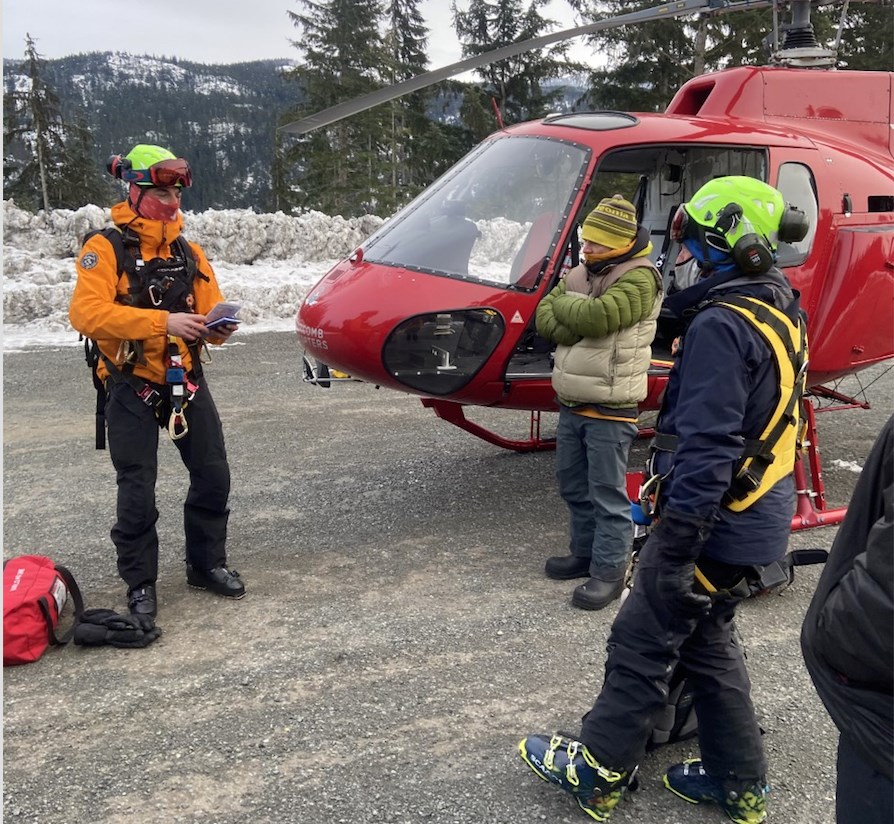Whistler Search and Rescue (WSAR) manager Brad Sills has a hot tip for anyone venturing into the Whistler backcountry this spring.
“More than ever, have extra clothing with you,” he said. “Down jackets and another base layer, some mitts. It’s not a lot of weight, just carry it with you.”
That’s not because Whistler is expecting to see temperatures plummet to unseasonably-cold lows this April. (In fact, Whistler’s forecast calls for double-digit highs this weekend.) Even during mild spring conditions, if an unfortunate series of events has you waiting until daybreak for WSAR’s help, those extra layers would “make your night so much better,” he said.
Sills’ advice comes following a busy month for WSAR volunteers, and a couple of less-than-comfortable nights spent outdoors for search subjects.
Crews received four calls for assistance from Saturday, March 18 to Monday, March 27, beginning with two ski-tourers stuck on top of a cliff face in the Callaghan Valley that first Saturday. With WSAR unable to retrieve the skiers by nightfall, the pair spent the night outside before they were rescued the following morning.
On Tuesday, March 21, WSAR managed to pull two European visitors out of the Cakehole after the pair found themselves lost on the south side of Whistler Mountain.
Then, on Saturday, an Ontario couple skiing Cowboy Ridge inadvertently skied parallel to Melody Creek on their way back down to the valley, missing the Singing Pass ski-out and suffering an equipment malfunction in the process. The pair ended up lost, deep in the trees. WSAR volunteers were in contact with the couple throughout the night, but weren’t able to retrieve the skiers by helicopter until the following morning. “They were excellent subjects,” said Sills. “They hung in there … They bedded down, made themselves somewhat comfortable. They had some extra equipment.”
The following day, Sunday, March 26, a group of four skiers heading down Whistler Mountain were met with a harsh reminder that ski tracks aren’t meant to be followed. The group had done just that, following in the couple’s tracks before realizing they were lost “slightly above,” where the pair found themselves stuck the previous night, said Sills.
“It’s the danger of people following tracks in terrain that they're not completely familiar with,” he added.
In the event of nighttime rescues, WSAR will often call on its counterparts from North Shore Rescue to respond with a night vision-equipped Talon Helicopter, but Sills said the resource was unavailable while the equipment was undergoing maintenance.
The lost party was fortunately able to bootpack back up to the Singing Pass trail and self-extricate at about 3 a.m., with the help of some guidance from WSAR and navigation apps.
A call-out to help a group of snowmobilers at Ring Lake after one member of the party dislocated their shoulder rounded out the busy 10-day period on Monday, March 27.
As Sills explained, the longer spring days have highlighted one new obstacle for WSAR in the wake of new Canadian Aviation Regulations that went into effect on Dec. 12, 2022. The amended rules placed tightened restrictions on commercial pilots' maximum flight and duty times. Under current regulations, solo helicopter pilots are limited to eight hours of flight time within a 24-hour period, and a total flight duty period of between nine and 13 hours, depending on what time of day that period begins. The new limits are, in some cases, making it more difficult for WSAR crews to find available pilots towards the end of the day, in Sills' experience.
“It just raises the alarm bells about being prepared, because the likelihood that you are going to be spending the night out is increasing as we grapple with this new challenge,” he said.
For volunteers waiting to respond to those calls for assistance, “obviously your compassion is being tested to its fullest,” said Sills. Still, the decision to postpone a rescue until morning is made carefully, by analyzing the urgency of the situation, he added.
“We have a metric that we use,” Sills explained. “We’re very fortunate at this time of year that, quite often, the atmosphere is inverted so the temperatures are actually warmer in the alpine than down below, and the overall temperatures are rarely much below zero.
“If you've been out ski-touring all day and you have good equipment on, you're going to be fine,” he continued. “Don't get me wrong, you're not going to be comfortable—there’s a difference—but you’re not in danger. You’re not going to lose any digits and you’re not going to die, you're just going to really reflect on your next trip and what you're going to bring.”
For a refresher on the importance of training, trip planning and packing the essentials before heading into the backcountry, visit AdventureSmart's website.






